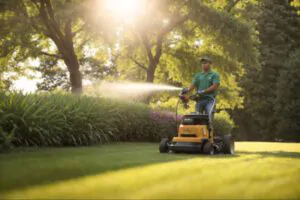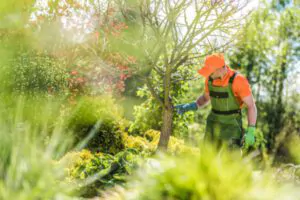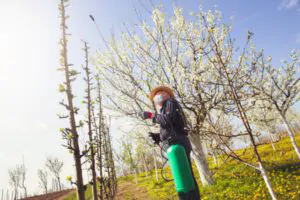Trees are a gift to your property – and tree spraying in Massachusetts can help you get the most out of them. The benefits of tree spraying can include improved aesthetics, pest and disease prevention, and increased property value. But there are also drawbacks to consider, such as environmental impact and potential health risks. This blog post will discuss the pros and cons of tree spraying in Massachusetts, so you can make an informed decision about your landscape care needs. So, what are you waiting for? Let’s get started!
Regulations and Restrictions in Massachusetts
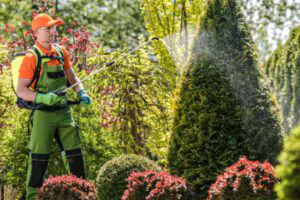
In Massachusetts, regulations and restrictions govern the use of pesticides and tree spraying to protect human health and the environment. The state has established laws and guidelines to ensure safe and responsible pesticide application. These regulations aim to minimize potential risks and encourage environmentally friendly practices.
One key aspect is the restriction on certain types of pesticides and spraying methods. Massachusetts has banned or restricted the use of specific pesticides that are deemed harmful to humans, animals, or the ecosystem. Additionally, the state encourages the adoption of alternative pest management strategies that prioritize prevention and non-chemical approaches.
Pros and Cons of Tree Spraying
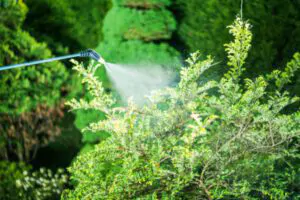
Now that you know the regulations and restrictions of tree spraying in Massachusetts, let’s look at the pros and cons.
The Pros
Tree spraying, when done appropriately and with careful consideration, can offer several benefits for the health and well-being of trees. Here are some pros of tree spraying:
Pest and Disease Control: Tree spraying can effectively control and prevent the infestation of pests and diseases that can harm trees. Spraying insecticides and fungicides helps to combat insect pests like aphids, caterpillars, and beetles, as well as fungal diseases such as powdery mildew or leaf spot. By addressing these issues proactively, tree spraying can help protect the tree’s foliage, prevent damage, and promote overall tree health.
Preserving Aesthetics: Healthy and vibrant trees enhance the visual appeal of landscapes, whether they are in residential areas, parks, or commercial properties. Tree spraying can help maintain the aesthetic value of trees by preventing defoliation, discoloration, or other visible signs of pest or disease damage. By keeping trees healthy and attractive, spraying can contribute to the overall beauty and value of the surrounding environment.
Protection of Other Plants: In certain cases, tree spraying can help prevent the spread of pests or diseases to nearby plants or vegetation. By controlling the infestation or infection in a specific tree, spraying can limit the risk of transmission to neighboring trees, shrubs, or crops. This can be especially beneficial in orchards, nurseries, or areas where multiple plants are in close proximity.
The Cons
While tree spraying can have its benefits, it’s important to consider the potential drawbacks and limitations associated with this practice. Here are some cons of tree spraying:
Environmental Impact: Tree spraying involves the use of chemicals, such as insecticides or fungicides, which can have adverse effects on the environment. These chemicals can potentially harm beneficial insects, pollinators, birds, and other wildlife. They may also contaminate soil, water sources, or nearby vegetation if not applied correctly or if runoff occurs.
Health Risks: Tree spraying involves handling and applying chemical substances, which can pose health risks to the individuals performing the spraying or coming into contact with the treated trees. Appropriate protective measures, like wearing protective clothing and using respirators, should be followed to minimize potential health risks.
Limited Effectiveness: Tree spraying may not always provide a long-term solution or complete eradication of pests or diseases. Some pests or diseases may have developed resistance to certain chemicals over time, making them less effective. Additionally, spraying may only target the specific pests or diseases present at the time of application and may not address other underlying factors that contribute to tree health issues.
Considerations for Tree Owners
Tree owners should be aware and informed of the pros and cons of tree spraying in Massachusetts. If you decide to use pesticides, it is important to consider alternative approaches like Integrated Pest Management (IPM) or natural pest control methods. These are more environmentally friendly and may reduce potential health risks. Ultimately, make an informed decision that fits your tree care needs and property goals.
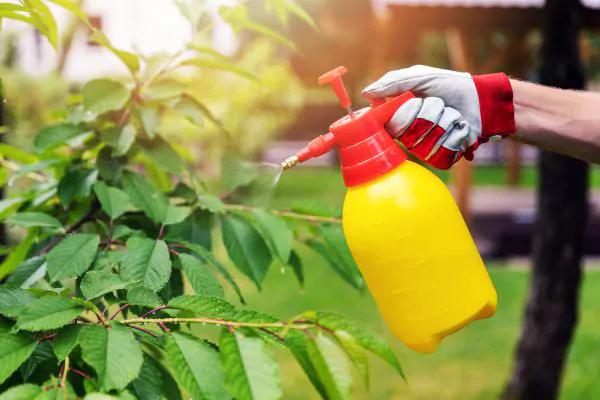
Conclusion

Trees make our outdoor spaces beautiful and can provide a number of environmental benefits. To get the most out of your trees, consider tree spraying in Massachusetts. Be sure to evaluate the pros and cons and research alternative pest management strategies before making a decision. With an informed choice, you can care for your trees safely and responsibly – protecting their health and enhancing their beauty. The next time you need help with your trees, Green Tech Tree offers tree spraying and other services. Contact us today for quality tree care in Massachusetts.
